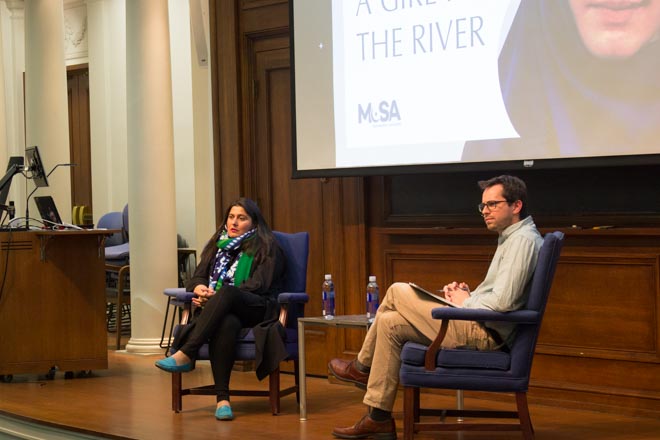
Yes, we are all happy for Leo at this year's Academy Awards, but filmmaker Sharmeen Obaid-Chinoy has more Oscars, and the subjects she has covered in her films are arguably much more pressing than fighting a bear.
That’s why we were thrilled to attend a screening of Obaid-Chinoy’s short documentary on Friday, A Girl in the River: The Price of Forgiveness, an Oscar-winner in the Short Subject Documentary category. After the screening, which was hosted by the Muslim Cultural Students Association, Obaid-Chinoy participated in a Q&A moderated by Daniel Majchrowicz, a professor in the Department of Asian Languages and Cultures. The discussion focused on the realities of current policies in Obaid-Chinoy’s Pakistani homeland, and how her film portrayed them.
Obaid-Chinoy won her second Oscar this year for A Girl in the River. The film focuses on Saba Qaiser, an 18-year-old woman who survived an attempted “honor killing” (an attempt at ending her life for bringing dishonor to her family) by her father after she marries her boyfriend against his wishes. Qaiser is pressured to forgive her father, as there is a loophole in Pakistan’s law that allows the accused to be exonerated from their crimes. The documentary sheds light on the concept of honor killing in Pakistan and the ramifications of legal forgiveness.
Obaid-Chinoy said that she had wanted to do a film about honor killings for some time, but individuals rarely survive to tell the tale.
TRAILER - A Girl in the River: The Price of Forgiveness from Sharmeen Obaid Films on Vimeo.
Obaid-Chinoy was the first Pakistani individual to win an Academy Award in 2012 for her short documentary Saving Face, about Pakistani individuals who had survived acid attacks. She praises the medium of documentary for its ability to grab attention by telling specific individuals’ stories, a tool she used in this film to shed light on a much larger issue.
“I have always felt that visual media connects people, and gets people to look at an issue from a perspective of all of those people who go through that process,” she said.
Also important to Obaid-Chinoy’s creative process in putting together the film was selecting a woman to be the main subject, a technique critical to her goal of empowering females.
“The religion that I have grown up in is a compassionate and tolerant religion,” she said. “It’s a religion that empowers women. And that’s why I pick up topics that are about women. Because it’s not the religion, it’s not the culture, it’s pure patriarchy and the fact that there’s always a power struggle. Men like to control women.”
Obaid-Chinoy also said that the issue of honor killings is no longer a partisan issue, and the main opposition she faces is from religious groups in Pakistan.
One of the most snap-worthy moments of the evening was when Obaid-Chinoy was asked how reception to her films in the West would differ if she dealt with an issue America was complicit with, such as drone killings. Obaid-Chinoy asserted, however, that with the Academy, it is more about storytelling than subjects.
When asked how the film would impact America’s perception of Pakistan, Obaid-Chinoy said that she is not a PR agent for Pakistan, and that reality is not pretty.
The film has screened across Pakistan, including several screenings hosted by Pakistan’s Prime Minister Nawaz Sharif. Obain-Chinoy said she hopes her film will continue to work toward ending the practice of honor killings going unpunished.
Her next project is 3 Bahadur: The Revenge of Baba Balaam, a sequel to her film 3 Bahadur, the first Pakistani computer-animated film. Obaid-Chinoy says that working on animation “helps her calm down.”
The evening ended with a standing ovation for Obaid-Chinoy. A Girl in the River: The Price of Forgiveness is available to stream on HBOGo and HBONow.